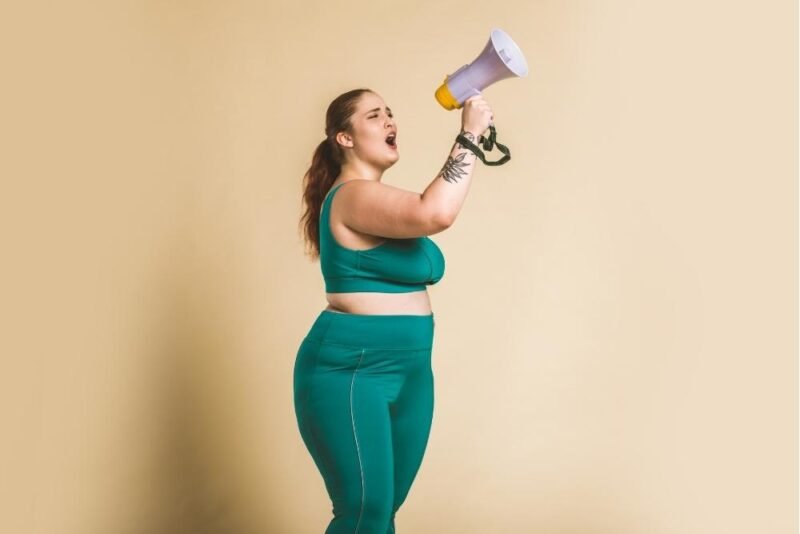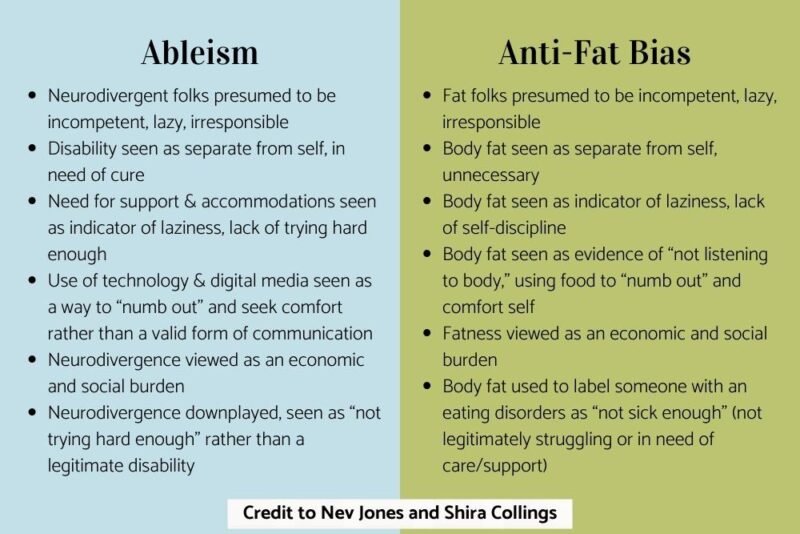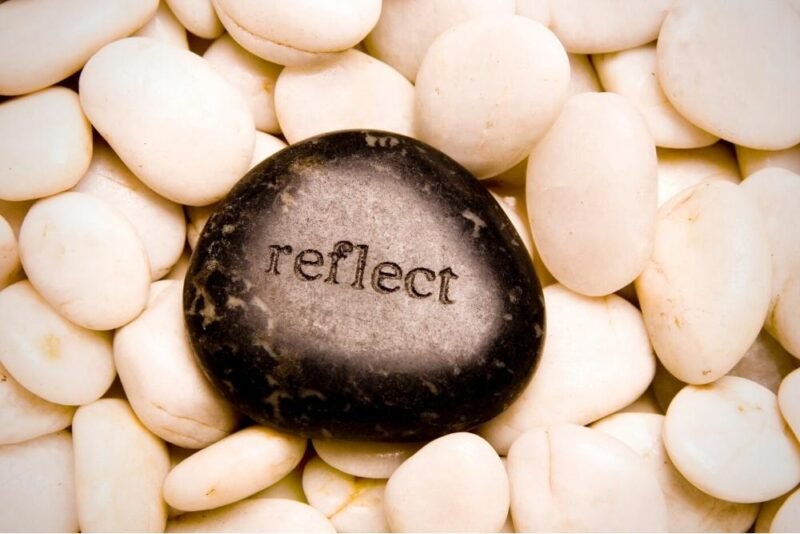

The matter of this web site submit is a single I only commenced to explore myself in the earlier calendar year or so. I was shocked, at very first, when it sunk in how ableist diet regime society is, with healthism and anti-fatness/sizeism as the backlinks. I realized how ablest (and healthist) my very own imagining was back again when I was deeply enmeshed in diet program culture, myself. And now that I see this darker aspect of eating plan culture, I can’t unsee it, and I want you to see it, much too.
Diet culture is just one particular of a lot of social methods in which people today are dealt with inequitably. It typically overlaps not just with ableism, sizeism and healthism, but also with racism, sexism, ageism and classism.
Eating plan lifestyle supports interpretations of private well being alternatives as moral character — it’s not just about fat reduction. Eating plan culture does not help the price of all bodies, and diet regime society does not exist in a vacuum.
Even if you really do not take into consideration by yourself to be on a “diet,” for the reason that you stay in diet tradition, you will still have thoughts, beliefs and behaviors — acutely aware or unconscious — that have been strongly affected by food plan culture. Unless of course you do the perform to cost-free your self, of program.
Intently connected to diet program society is exercise society, which, not shockingly, is also healthist and ableist, sending subtle or not-so-delicate messages that workout ought to be applied to “overcome” or stay clear of incapacity, due to the fact disabled bodies have significantly less price.

What is “disability”? What is “ableism”?
So, what do I imply when I say “disabled”? I’m not only chatting about needing to use a wheelchair, a walker, a cane or other mobility support products. Disabilities can be noticeable, or not visible. Anyone with a wellness issue that has an effect on their strength, endurance or mobility would be disabled, and that may possibly not be totally visible. Or, someone could be neurodivergent, which typically is invisible.
“Neurodivergent” is expression for individuals with cognitive and/or neurological procedures that vary from what is deemed — by cultural/societal and health care criteria — to be “typical” or “normal.” This consists of people with autism, ADHD, anxiousness, despair and borderline character, as properly as folks who are highly delicate to sensory stimulation.
I found this definition by law firm and social justice activist Talila “TL” Lewis to be comprehensive and impressive:
“A process of assigning value to people’s bodies and minds centered on societally produced tips of normalcy, productivity, desirability, intelligence, excellence, and fitness. These produced thoughts are deeply rooted in eugenics, anti-Blackness, misogyny, colonialism, imperialism and capitalism.
“This systemic oppression sales opportunities to men and women and society identifying people’s price centered on their culture, age, language, visual appeal, faith, birth or living position, “health/wellness,” and/or their potential to satisfactorily re/produce, “excel” and ‘behave.’
“You do not have to be disabled to practical experience ableism.”
What ablism and anti-fatness/sizeism have in prevalent is the perfect — held by the clinical technique and culture at large — that remaining fats and remaining disabled are both equally abnormalities that the specific need to operate really hard to get over. Also, that acquiring a overall body that is abnormal in this way indicates that you are not regular, and not very human. [Note that I use the word “fat” as a neutral descriptor, like short or tall.]
Which is total and utter bullsh*t.

A first seem at ableism and anti-body fat bias
Just as you really do not have to be disabled to experience ableism, you really do not have to be unwanted fat to encounter anti-body fat bias. If you are a slim man or woman who diet programs or workout routines to remain slender, it’s at minimum in aspect for the reason that you are worried of starting to be unwanted fat. It may possibly also due to the fact you are concerned of becoming “unhealthy” or enduring a reduction of mobility.
I have had consumers in more substantial bodies who also occur to have some mobility troubles explain to me how crucial it was for them to test to stroll or shift “normally.” This is significantly less about how movement feels in their overall body, and additional about how they may well be judged by other if they are body fat AND they stroll slowly. I have also had neurodivergent clients in greater bodies truly feel greater strain to mask signals of their neurodivergence.
Systemic oppression based on no matter whether another person adheres to societal ideals of “normalcy” and “intelligence” impacts disabled and neurodivergent folks, as properly as excess fat folks. This can incorporate:
- Concentrating on cutting down “symptoms” of neurodivergence — or on losing fat — by means of nutrition interventions.
- Viewing neurodivergence — or “excess” human body excess fat — as something to “cure.”
- Concentrating only on how neurodivergent and excess fat men and women can cope in an ableist/anti-excess fat world as a substitute of concentrating on earning the globe additional obtainable and helpful to a numerous assortment of people.
On that final position, persons living in body fat bodies may possibly have problems finding desirable clothes (or any clothes that are not tailor made-designed) that healthy. They may perhaps dread going to eating places, theaters or on airplanes because they know (or aren’t positive) if the chairs or seat will accommodate their bodies. People living with a bodily incapacity may perhaps also have issues acquiring apparel and seats (or complete properties) that are created to meet their demands.

How healthism plays a connecting function
Healthism is a philosophy that overemphasizes individual duty in wellness results and prioritizes pursuing health and fitness higher than all else. This can consist of:
- Demonizing having for satisfaction, joy, comfort, or stimulation. (There should be no disgrace in getting enjoyment/joy/consolation from food items, and foodstuff can be an vital variety of stimulation, or stimming, for some neurodivergent individuals.)
- Shaming folks for deciding on benefit food items, despite the fact these foods may be satisfying, and may possibly be a saving grace for active folks as perfectly as individuals who find it tough mentally or physically to cook a meal “from scratch.”
- Viewing wellbeing (and the pursuit of wellbeing) as a moral obligation.
I have a great deal to say on that previous point, but let’s begin by pointing out what may well be noticeable: Numerous folks are (reluctantly) eager to give unwanted fat individuals a pass “as long as they are healthful.” This is section of the “excellent fatty” trope — be active, beautiful and effective, and never accept your latest overall body as Ok. (If you are extra fat and dare to like by yourself, someone could accuse you of “glorifying obesity.”
I have had a lot of clientele in larger bodies notify me they experience they have to have to glance like they are hoping to shed body weight or “get healthy” — ordering the salad, likely to the fitness center, bragging about their excellent cholesterol and blood sugar stages — even when they are in the course of action of unsubscribing from diet plan culture and building peace with foods and their bodies.
When an individual “concern trolls” a fats particular person on social media (or elsewhere), what do they say? Typically anything like, “but you’re not healthy” or “you’re heading to get diabetic issues.” Yep, ableism (and healthism) are inherently baked into anti-fatness.
Even though it’s accurate that pounds and wellbeing are not closely joined (affiliation does not show causation), I have occur to adhere to statements I make about that level with an additional statement that can be even thoughts-blowing: being nutritious and/or pursuing health and fitness is not a ethical crucial.
Mic drop.

Well being isn’t a guarantee, or a measure of worthiness
Fairly basically, “health,” as it is typically outlined, is not a source that is offered to everybody. Some people today never ever have that resource. Other people today intermittently have it. However other people have it for a while, then don’t have it, and by no means have it once again.
Like it or not, if we are fortunate ample to reside prolonged plenty of, items are going to transpire to our bodies. We may well locate that our joints ache, that we obtain bodyweight, that our blood force developments greater, that we need to have to use a walker or a wheelchair, that we get cancer. Our bodies are no much less worthy. We are no significantly less deserving.
When I was nevertheless doing “non-eating plan pounds management” (which I finally understood was not a detail) I would typically help consumers established “meaningful” aims. In other phrases, alternatively of making use of fitting into “skinny jeans” as a aim, we would use “keeping up with your kids” as a aim. Yep, that is absolutely ableist. Some mother and father will never be equipped to “keep up with” their children or get down on the ground to play with their youngsters. That doesn’t make them lousy or ineffective mother and father.
Fat men and women and neurodivergent men and women have generally existed, so alarmist headlines (and the general public well being machinations behind them) about the “ob*sity epidemic” or the “autism epidemic” seriously spread the notion that any individual who diverges from what has been labeled “normal” ought to be removed or erased. We saw this evidently in just one not-so-charming chapter of our country’s heritage involved what have been recognised as “ugly laws.”
From 1867 to the commencing of Entire world War I, some U.S. towns enacted so-termed “ugly laws” banning folks deemed “diseased, maimed, mutilated or in any way deformed so as to be an unsightly or disgusting object or improper person” from public spaces. While these legal guidelines turned significantly less enforced around time, Chicago did not repeal its “ugly law” right until 1974, when an alderman took up the trigger, calling the legislation “cruel and insensitive” and “a throwback to the Middle Ages.”

A second glance at ableism and anti-fatness
For this segment, and the graphic over, I give heavy credit rating to mental overall health researcher and professor Nev Jones and therapist Shira Collings, who gave a communicate alongside one another at an RDs for Neurodiversity meeting I attended earlier this 12 months.
They mentioned the strategy of “excess” is an underlying thread beneath anti-excess fat bias and ableism. Body fats/fatness is observed as surplus physique tissue, and as a final result of extreme feeding on. The information is also that the overall body alone is virtually “excess” – that overall body sizing is unbiased of who we are. Exact same with neurodiversity – incapacity and incapacity accommodations as an “excess,” accommodations as unwanted.
The two excess fat and neurodivergent folks confront objectification and disempowerment, as they are not seen as the authorities on their possess needs. I consider this is genuine for men and women who have other forms of incapacity, as properly.
Jones and Collings pointed out that neither body extra fat or neurodivergence are things that have to have to be healed or eradicated, and that our bodies are pieces of our minds and ourselves.
- Our cognition (wondering) is influenced by our bodies, and fat suppression can have a important detrimental affect on our pondering.
- When another person is within their established stage range—which may well contain remaining fat—this is required and in fact essential to how they perform and who they are.
There is some really serious meals for thought there.

So now what? Techniques to reflect
Did this post truly feel like a good deal? If it did, that’s Ok. I hope it opens a door to checking out your personal ideas, inner thoughts, beliefs and assumptions about what bodies (and minds) are deserving and useful. Right here are some questions to get you contemplating:
- What strategies of staying distinctive get labeled as “bad” or “inferior” in our culture? Do you concur or disagree with these labels?
- In what means do you label other persons as getting less worthy? Do you experience like you do this consciously, or unconsciously (like probably you absorbed these concepts from culture but haven’t genuinely examined or questioned them)? How are these people diverse from you? Do you detect any panic that you could sometime be like these men and women?
- Ought to persons have to modify their bodies or minds to “fit in,” or ought to our modern society and its units evolve to be additional inclusive of all varieties of people today?
- Do you choose (consciously or unconsciously) folks who are “unhealthy”? Do you make a difference involving acquiring a ailment or incapacity that is “preventable” vs. 1 which is not? Why?
- Do you consider it is a ethical imperative to pursue overall health? Why or why not? If you do, how does this align (or conflict) with other beliefs you have about system autonomy?
- Do you believe that that we have particular control in excess of our overall health? If certainly, can you believe of any or examples in which which is not the situation?
- If you know that you choose people today primarily based on their dimension, capability, overall health or other variables, how does that make you experience? Have you been judged by other people (or by yourself) based on some thing about you which is diverse? How did that make you truly feel?
- Do you stand opposed to some types of oppression (say, racism) but obtain that you let other forms of oppression slide by? Why?
Some of these questions may reveal answers about you that make you cringe. If so, which is Okay. Tactic them with curiosity and self-compassion, and if you find that you have some beliefs or mindsets that require to improve, then start out to transform them. If we aren’t knowledgeable of our ideas, thoughts, beliefs and behaviors, then we stay caught. Recognition (once more, paired with curiosity and self-compassion) opens the doorway to understanding greater, and carrying out far better.
Carrie Dennett is a Pacific Northwest-primarily based registered dietitian nutritionist, freelance author, intuitive ingesting counselor, author, and speaker. Her superpowers include busting nourishment myths and empowering gals to sense improved in their bodies and make food items choices that assistance enjoyment, diet and health and fitness.
 Print This Submit
Print This Submit






